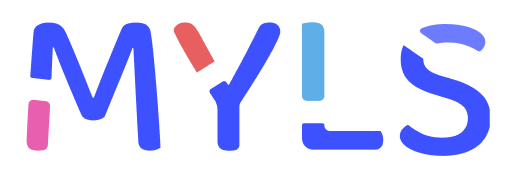Mastering IB History SL: A Global Perspective on Power, Protest, and Conflict | Myls Tutoring
The IB History SL course challenges students to think critically about global power, conflict, and protest. With a focus on analytical writing, source evaluation, and comparative study, Myls Tutoring helps students thrive with personalized support and exam prep.

IB History SL Course Overview
The IB History SL (Standard Level) course explores global political, social, and military developments from the 20th century through key comparative case studies. Students investigate themes such as authoritarianism, war, civil rights, and the Cold War using both primary and secondary sources. With a strong emphasis on research, analysis, and essay writing, the course equips students with critical thinking skills and a global perspective on historical processes.
From analyzing the rise of authoritarian leaders to evaluating protest movements across continents, students will develop a nuanced understanding of power, ideology, and change. IB History SL prepares students for the rigors of the IB assessments and builds valuable skills for university-level study and future careers in law, international relations, history, and public policy.
Why Is IB History SL Important?
IB History SL empowers students to critically examine how past events have shaped the world today. Through comparative analysis, students understand different political systems, social movements, and ideological conflicts. They gain the tools to recognize bias, evaluate evidence, and craft persuasive arguments—essential skills for informed citizenship and academic success.
For students interested in fields such as international law, diplomacy, education, or journalism, the course offers a foundation in historical reasoning and global awareness.
IB History SL Course Structure
Students explore history through a thematic and comparative framework, typically including the following areas:
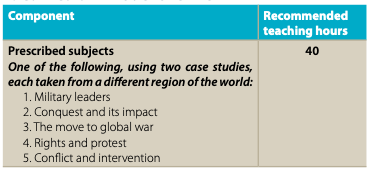
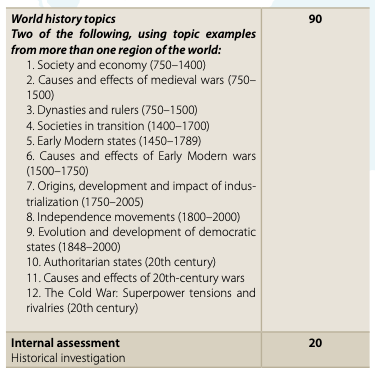
- Authoritarian States: Investigating the rise, rule, and impact of leaders such as Hitler, Stalin, Mao, and Castro.
- 20th-Century Wars: Exploring the origins, strategies, and effects of major wars including World Wars I and II, the Spanish Civil War, and the Vietnam War.
- The Cold War (1945–1991): Understanding ideological rivalry, global influence, and proxy conflicts between superpowers.
- Rights and Protest: Analyzing movements such as the U.S. Civil Rights Movement and the anti-apartheid struggle in South Africa.
- Comparative Studies: Evaluating similar historical themes across different regions and time periods.
This structure ensures students develop both depth and breadth of knowledge across regions and contexts.
IB History SL Course Skills and Learning Outcomes
By the end of the course, students will be able to:
- Interpret and evaluate historical sources with accuracy and insight.
- Construct well-organized, evidence-based historical arguments.
- Compare historical developments across different regions and time periods.
- Analyze causes, consequences, and significance of major global events.
- Conduct independent historical investigations.
These skills are highly transferable to university studies and careers in the humanities and social sciences.
Prerequisites for IB History SL
There are no formal prerequisites for this course, but students should be curious about global events and open to evaluating multiple perspectives. Strong reading and writing skills are beneficial, as is a willingness to engage in debate and independent research.
IB History SL Assessment Structure
IB History SL assessments focus on both written and source-based responses. Students are evaluated through:
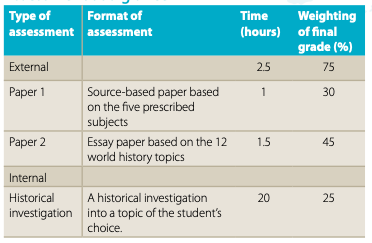
- Paper 1: Source-based questions tied to a prescribed topic (e.g., Rights and Protest).
- Paper 2: Essay responses comparing historical themes across case studies (e.g., Causes of Wars, Authoritarian Leaders).
- Internal Assessment: A historical investigation where students select, research, and analyze a topic of their choice.
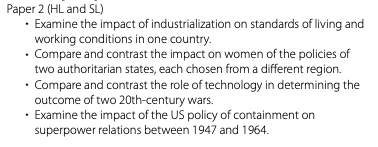
Students must demonstrate the ability to synthesize information, build historical arguments, and reflect on different interpretations of the past.
Tips for Success in IB History SL
- Engage with Sources: Analyze primary documents for bias, context, and perspective.
- Master Essay Structures: Learn how to plan, outline, and write cohesive historical arguments.
- Practice Comparative Thinking: Draw connections between regions, leaders, and ideologies.
- Keep a Timeline: Track key events and historical turning points for better retention.
- Refine Your Research: Use reputable sources and practice citing evidence accurately.
- Prepare for Papers 1 & 2: Practice with past IB questions and understand how to meet assessment criteria.
How Myls Tutoring Can Help You Succeed in IB History SL
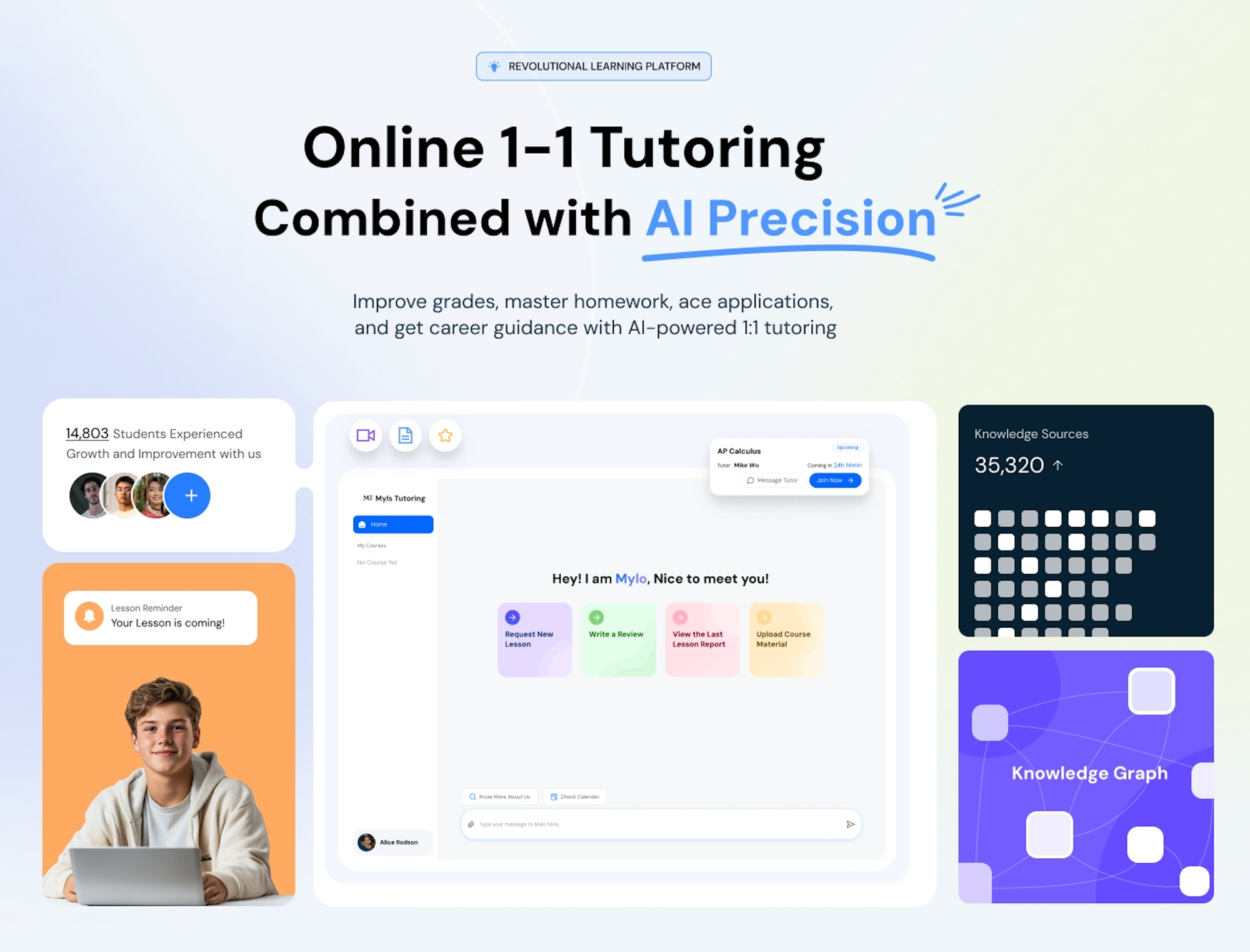
At Myls Tutoring, we offer personalized support that aligns with the specific demands of the IB History SL curriculum. Our expert tutors guide students through the intricacies of historical analysis and writing, helping them build confidence and develop the skills needed to excel in both internal and external assessments.
✔ Online Tutoring Platform finds a tutor who fits your learning goals, subject needs, and study style!
✔ Personalized lesson plans that target students’ unique strengths and challenges
✔ Step-by-step online coaching on how to approach Paper 1 source questions and Paper 2 essay responses
✔ Support for the Internal Assessment, from topic selection to final draft review
✔ Guidance on comparing case studies, crafting thesis-driven essays, and managing historical evidence
✔ Interactive tools to strengthen understanding of cause-effect relationships and historical timelines
✔ Exam prep strategies tailored to IB mark schemes and time management techniques
Myls Tutoring also help students stay motivated and organized throughout their coursework by setting manageable goals and providing consistent feedback.
📚 Book a Free Trial Lesson Today and start mastering IB History SL with expert support from Myls Tutoring!
Explore more IB courses on Myls Tutoring and get personalized support in subjects like Economics, Global Politics, Geography, and more!
